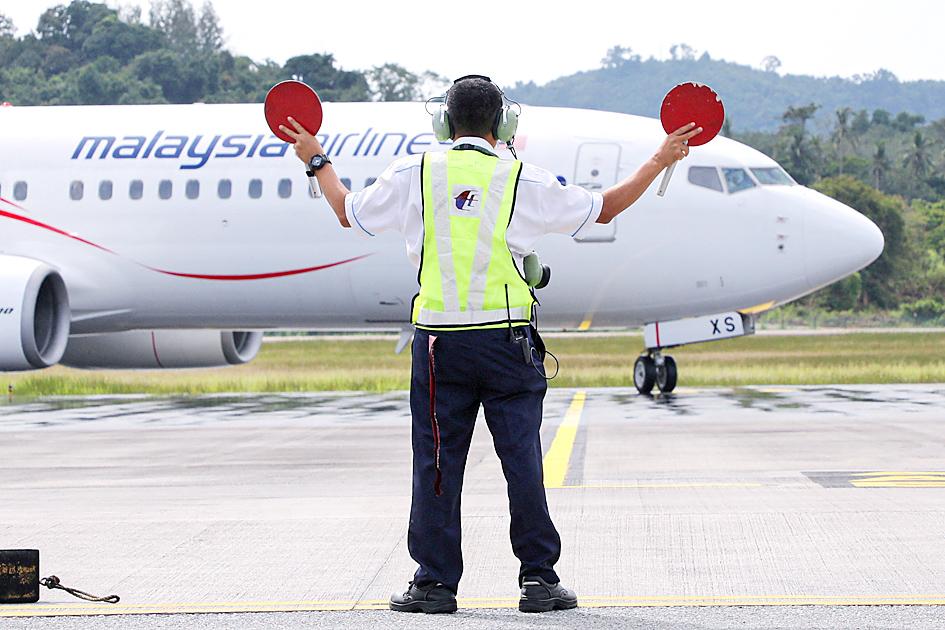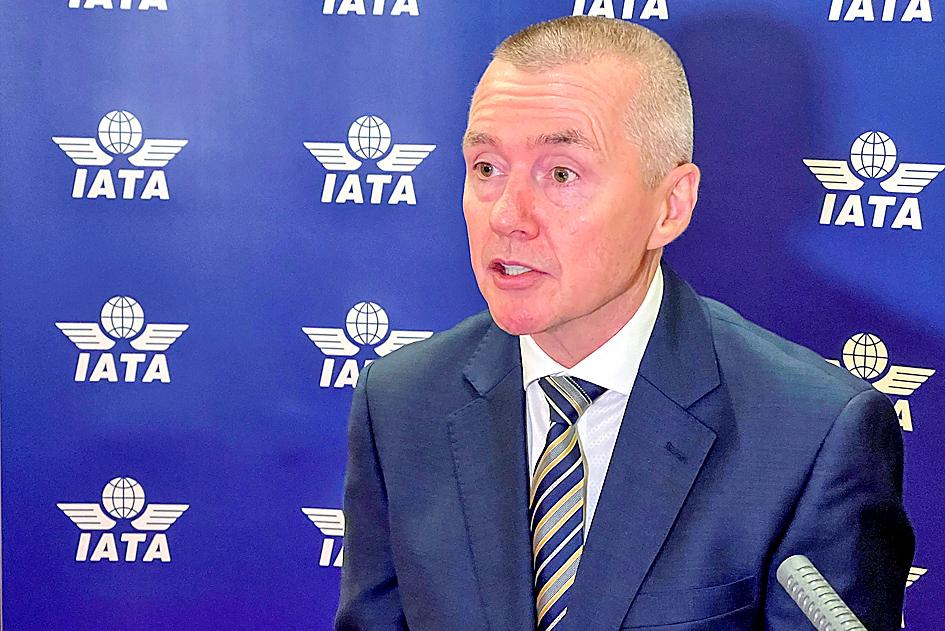The airline industry would return to profit next year as pent-up demand for travel sustains bookings even as the global economy tightens, the International Air Transport Association (IATA) trade group yesterday.
Losses this year are likely to total US$9.7 billion as air travel begins its recovery from the COVID-19 pandemic, IATA said in an update at its annual meeting in Doha, an improvement on the US$11.6 billion deficit predicted at the previous gathering in October last year.
“Industry-wide profit should be on the horizon in 2023,” IATA director-general Willie Walsh told the gathering of airline heads. “We are rebounding. By next year, most markets should see traffic reach or exceed pre-pandemic levels.”

Photo: Reuters
While most carriers worldwide are enjoying bumper sales as customers flood back following the lifting of COVID-19 curbs, taking leisure trips and catching up with friends and family, there are doubts about how long the surge will continue as high fuel prices push airlines to hike fares and inflationary pressures weigh on household spending.
Walsh said that while “there is no way to sugar coat the bitter economic and political realities,” at the same time “the desire to travel and the necessity of moving goods are both solid.”
IATA also said that last year’s loss amounted to US$42 billion, better than the US$52 billion shortfall previously envisioned.

Photo: Reuters
The industry has emerged “leaner, tougher and nimble,” having defied predictions for widespread bankruptcies and failures, Walsh said.
The situation was helped by the industry having enjoyed its best-ever run of profits prior to the pandemic, although fixing balance sheets carrying debts of US$650 billion remains a “monumental challenge,” he said.
Walsh, previously chief executive officer at British Airways parent IAG SA, told Bloomberg Television on Sunday that previous experience suggests the effects of an economic slowdown would not be so great, pointing to the global financial collapse of 2008, after which passenger numbers held steady in 2009 and showed strong growth in 2010.
He also said that he does not expect staffing shortages that have disrupted flights to be a major issue as travel peaks in coming months, with carriers taking steps to rein in capacity where necessary.
Passengers “can book with confidence,” knowing that problems are “isolated and it will be addressed,” he said.
Customers can expect to see higher fares as a consequence of surging fuel prices, especially outside the US, where a lack of hedging led to an immediate hike, Walsh said, adding that the effects might be “marginal” with no massive hit to demand.
On the positive side, higher jet fuel prices could encourage the switch to sustainable aviation fuel, with the price differential between the two now much narrower, he said.
Walsh said he sees the war in Ukraine remaining a long-term challenge for airlines, although the effect on most carriers has been “pretty limited,” apart from a handful such as Finnair Oyj, whose eastbound network has been largely wiped out by the conflict.

Stephen Garrett, a 27-year-old graduate student, always thought he would study in China, but first the country’s restrictive COVID-19 policies made it nearly impossible and now he has other concerns. The cost is one deterrent, but Garrett is more worried about restrictions on academic freedom and the personal risk of being stranded in China. He is not alone. Only about 700 American students are studying at Chinese universities, down from a peak of nearly 25,000 a decade ago, while there are nearly 300,000 Chinese students at US schools. Some young Americans are discouraged from investing their time in China by what they see

MAJOR DROP: CEO Tim Cook, who is visiting Hanoi, pledged the firm was committed to Vietnam after its smartphone shipments declined 9.6% annually in the first quarter Apple Inc yesterday said it would increase spending on suppliers in Vietnam, a key production hub, as CEO Tim Cook arrived in the country for a two-day visit. The iPhone maker announced the news in a statement on its Web site, but gave no details of how much it would spend or where the money would go. Cook is expected to meet programmers, content creators and students during his visit, online newspaper VnExpress reported. The visit comes as US President Joe Biden’s administration seeks to ramp up Vietnam’s role in the global tech supply chain to reduce the US’ dependence on China. Images on

New apartments in Taiwan’s major cities are getting smaller, while old apartments are increasingly occupied by older people, many of whom live alone, government data showed. The phenomenon has to do with sharpening unaffordable property prices and an aging population, property brokers said. Apartments with one bedroom that are two years old or older have gained a noticeable presence in the nation’s six special municipalities as well as Hsinchu county and city in the past five years, Evertrust Rehouse Co (永慶房產集團) found, citing data from the government’s real-price transaction platform. In Taipei, apartments with one bedroom accounted for 19 percent of deals last

US CONSCULTANT: The US Department of Commerce’s Ursula Burns is a rarely seen US government consultant to be put forward to sit on the board, nominated as an independent director Taiwan Semiconductor Manufacturing Co (TSMC, 台積電), the world’s largest contract chipmaker, yesterday nominated 10 candidates for its new board of directors, including Ursula Burns from the US Department of Commerce. It is rare that TSMC has nominated a US government consultant to sit on its board. Burns was nominated as one of seven independent directors. She is vice chair of the department’s Advisory Council on Supply Chain Competitiveness. Burns is to stand for election at TSMC’s annual shareholders’ meeting on June 4 along with the rest of the candidates. TSMC chairman Mark Liu (劉德音) was not on the list after in December last